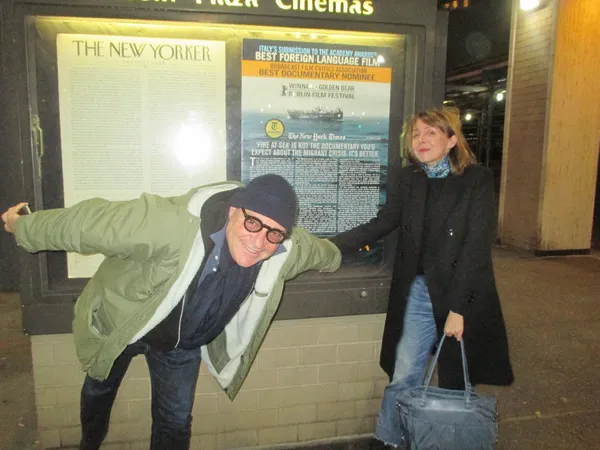 |
| Gianfranco Rosi with Anne-Katrin Titze after the screening of Fire At Sea: "The only intuition I had at the beginning was to find a little boy as a point of view." Photo: Emilie Spiegel |
In 2014, Gianfranco Rosi presented Sacro GRA, his nonjudgmental gaze that lands on bodies that matter at the Film Society of Lincoln Center. He returned this year for the New York Film Festival with his Berlin Film Festival Golden Bear winner, Fire At Sea (Fuocoammare), a masterpiece not only of documentary filmmaking but of timely and abiding storytelling.
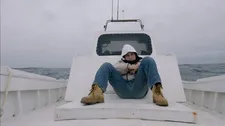 |
| Gianfranco Rosi on Samuele Pucillo: "He was eleven when I met him. He is like an old Woody Allen." |
Rosi's early films Boatman, Below Sea Level and El Sicario, Room 164 will be screened at a BAMcinématek retrospective along with Italy's Foreign Language Film Oscar submission Fire at Sea, which will also screen at DOC NYC next month.
Director/cinematographer Gianfranco Rosi understands that the way to the audience's conscience is not through images of suffering crosscut with "expert" talking heads giving statistics. The symbolism in Fire At Sea is so organic that it might dawn on you hours or days after seeing the film. What eye should we start to train? When metaphors aren't artificial, they take your breath away. Will the diver in the reefs find more than sea urchins?
Italy's southernmost island, Lampedusa, south of Sicily, in the Mediterranean Sea, where waves of migrants from Africa arrive in boats often under inhumane conditions is beautiful and rough. The images from the rescue operations conjure up a multitude of emotions and references - the boats and helicopters have a science fiction feel of an alien invasion. More and more, it dawns on us that these aren't separate stories at all. Time is standing still and races on.
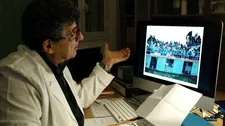 |
| On Doctor Pietro Bartolo's work in Lampedusa: "He has this incredible generosity of a human being who is there between these two worlds." |
On the opening weekend of the Kino Lorber theatrical release of Fire at Sea at Lincoln Plaza Cinemas, before a Q&A with the audience, Gianfranco and I began with where we left off.
Anne-Katrin Titze: In 2014, we had a conversation on Sacro GRA and you told me that the structure of the film - which is about the road [Grande Raccordo Anulare] around Rome - for it to work, you had to open up the circle and make it an "infinite line" to make the film. So my question is about the structure for this film [Fire At Sea]. Was there an open sesame moment on how to structure this fantastic film?
Gianfranco Rosi: Well, every film somehow has a completely different approach. But I remember that sentence. It was a circle opening up to make it infinity, a line, a straight line. There was geometry in that film which was very particular. And also in this film, when I started this film, I was trying to scrabble certain sketches in order to give me an itinerary. But this [Fire At Sea] is a film somehow with less thought. Sacro GRA was a very painful process for me. I had really to struggle a lot to find the characters, to find the structure, to find the stories. And here I always had the feeling that the film somehow came very naturally.
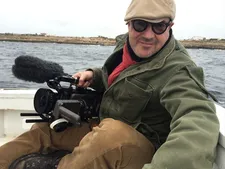 |
| Gianfranco Rosi as cinematographer: "I wanted to keep that completely almost surreal - that element in the film." |
Although when I started the film, I didn't have … I had zero idea. The only intuition I had at the beginning was to find a little boy as a point of view. Yesterday, I was at the opening and someone asked 'Why did you choose a boy, not a girl?' I was completely [laughs, shakes his head].
Maybe because I met Samuele [Pucillo]! As simple as that. He was just an encounter, random encounter, and I fell completely in love with him. He was this incredible kid. He was eleven when I met him. He is like an old Woody Allen. The head of Woody Allen and that tiny little body. Immediately, I felt so much engaged with him. You know, his life. He had something very ancient on him and linked to the past. Linked to a rich world. Like somehow all the characters of the film are linked to a rich world. To somehow a very strong identity, a very strong archetype idea of someone.
So, when I started the film, at that time, Lampedusa, there were not many migrants arriving. Because the hot spot center was burnt so people were not arriving there. Exactly that year, the border was moved from Lampedusa into the middle of the sea. So all the boats arriving to Lampedusa which before, years back - they used to arrive directly in Lampedusa. Now they are intercepted, rescued in the middle of the sea and then brought to Lampedusa where people stay very little time, just two, three days and then go back to Italy.
!["So at the beginning there were no migrants and then slowly, slowly when the center opened, they started arriving there [Lampedusa]."](/images/newsite/Fire at Sea(1)_225.webp) |
| "So at the beginning there were no migrants and then slowly, slowly when the center opened, they started arriving there [Lampedusa]." |
So at the beginning there were no migrants and then slowly, slowly when the centre opened, they started arriving there. But I felt that these two worlds - they never came together. So Lampedusa in my mind and when I was there I was experimenting. Even this tiny little island - you could go around the island in two hours walk - so even in a space so small, there's no interaction between these two worlds. Except the figure of the doctor in my film. So this for me became like a microcosm, a metaphor of what Europe is right now. Where these two worlds never somehow interact.
When people ask me, 'why Samuele never meets the migrants in your film?' Because he doesn't in his life. He doesn't have a chance to. Also there the news arrives through the radio. 250 people died. [A woman in the film reacts to hearing the news while cooking and says] 'Poor people'. That's what we do constantly, they're just numbers, they're just things. And in Lampedusa the migrants arrive as this wave of almost aliens. Very hard to get in contact with. They stay two days and then they leave. So it was this constant wave of people passing by with great difficulties of meeting and interacting with them.
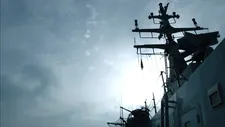 |
| On the "phantom boat" in Fire At Sea: "Now they are intercepted, rescued in the middle of the sea and then brought to Lampedusa ..." |
AKT: Two things you said just now, I want to follow up on. You say Samuele is in some respect ancient. There is something in the film about time that is very unusual. I was thinking, we are now in the greatest migrant refugee crisis since the Second World War. There is a lot of reference to that time and time before that in your film. On the other hand, you have something very futuristic. Those rescue boats almost look like aliens that arrive from outer space.
GR: I always say, aliens that go and save aliens.
AKT: That's absolutely the feeling.
GR: Somehow that for me was an extreme image I wanted to push in the film. Also people ask me 'why you didn't give a story to that boat?' Because that would have been the fifth story in the film. It would have been too much to handle. So I was imagining this boat that left to save someone eventually. This boat was like a phantom boat for me.
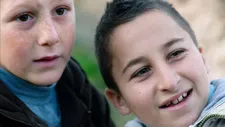 |
| Mattias Cucina with Samuele Pucillo: "The weekend was his space. He was going wild into the fields ..." |
I spent 40 days on this boat, even more, even 60 days. So it was a really long, long time. And people all dress up. When there is a rescue that they have to do, the whole boat prepares to start the rescue. The first thing that we had to do, also myself, was to dress completely white and put on goggles and put on gloves. We became these kind of aliens.
So I thought what's the point to have stories of people when there is the moment of facing the rescue, we are not going to recognise them? They are going to be like phantoms with no identity anymore. So I wanted to keep that completely almost surreal - that element in the film. Although, as I said, everything you saw in the film is completely true. It's a documentary, the film. But also, in the structure of the film when I edit the film, it became somehow more close to a narrative arch, you know. More close to an emotional editing and not to a rational editing of the film.
AKT: The symbolism in the film is so organic. It took me hours after seeing the film when I realised how far some of these metaphors really go. They are in both worlds, on the one hand real, on the other highly symbolic. "What's your position? What's your position?" is being asked by the rescuers. Yeah, that's the question the film asks us: What's your position?
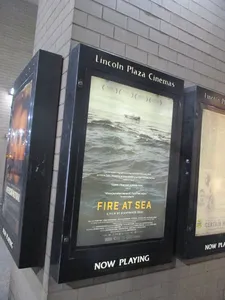 |
| Fire At Sea poster - Lincoln Plaza Cinemas in New York Photo: Anne-Katrin Titze |
GR: Yeah. What's your position?
AKT: Also, a diver looking for sea urchins. The film is filled with this kind of very strong symbolism. Retraining the eyes. Did these happen to you?
GR: As I was trying to say at the beginning, it's exactly this. Samuele, when I discovered him and fell in love with him, when I was saying, oh, he is going to be part of my film, I didn't know he was going to become the protagonist of the film. I was filming him for a long time, for a year, not every day of course. Sometimes for a whole month I didn't see him, or I don't film him for two weeks. Actually we were mostly filming him on the weekend because he was free from the school. Except that one scene that I shot at school. The weekend was his space. He was going wild into the fields - that was mostly when I was filming him.
When I was filming him, I discovered within himself an incredible, deep world. That was always a metaphor, always in suspension and creates this very emotional state of being. At the end, Samuele is coming of age. It's the struggle of a kid facing life. It's like the anxiety, the things, the rowing and he doesn't want to row and he doesn't want to go because he is suffering on the sea. And he has to go train himself and he has to become a fisherman. And the school is terrible. The English, his English seems like he speaks Arabic.
_225.webp) |
| Gianfranco Rosi listens to the popcorn kettle Photo: Anne-Katrin Titze |
So life is difficult, you know. As much as his life is difficult, you can understand it. When something arrives to you which is bigger than life we always say - that's what somehow I feel. The migrant world, this tragedy that is arriving constantly towards the island. You perceive it but you don't really grab, grasp it. Because unless you are there in the middle of the sea you don't have a chance of experiencing that. That's how I feel, that the state of the mood of Samuele was somehow exactly what we perceive about something we don't know, that is coming toward us and we are not able to look at. We also have the lazy eyes. Maybe even blind eyes most of the time right now. And that's somehow how I structured the story of the film.
And of course in-between these two worlds is this incredible man that I had the luck of meeting. He is an incredible human being, really. Doctor [Pietro] Bartolo, he is someone that has been there for 20 years. Every single approach of migrants in Lampedusa, he is there at two o'clock in the morning, four o'clock in the morning, one o'clock at night, every time he is there. He visited over like 400,000 people in the last twenty years. And this man, he is also the doctor of the Lampedusan people. He has this incredible generosity of a human being who is there between these two worlds. He is really an example of what we should do somehow.
BAMcinématek Presents Gianfranco Rosi runs from October 28 through November 3.
Fire At Sea will screen in the DOC NYC Short List program on November 12 at 12:45pm - Cinepolis Chelsea - Expected to attend: Gianfranco Rosi





















